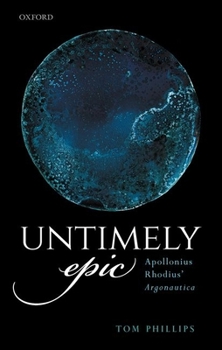Untimely Epic: Apollonius Rhodius' Argonautica
Apollonius Rhodius' Argonautica is a voyage across time as well as space. The Argonauts encounter monsters, nymphs, shepherds, and kings who represent earlier stages of the cosmos or human society; they are given glimpses into the future, and themselves effect changes in the world through which they travel. Readers undergo a still more complex form of temporal transport, enabled not just to imagine themselves into the deep past, but to examine the layers of poetic and intellectual history from which Apollonius crafts his poem. Taking its lead from ancient critical preoccupations with poetry's ethical significance, this volume argues that the Argonautica produces an understanding of time and temporal experience which ramifies variously in readers' lives. When describing the people and creatures who lived the past, Apollonius extends readers' capacity for empathetic response to the worlds inhabited by others. In the ecphrasis of Jason's cloak and the account of Jason's conversations with Medea, readers are invited to scrutinize the relationship between exempla and temporal change, while episodes such as the taking of the Golden Fleece explore links between perceptions and their temporal situation. Running through the poem, and through the readings that comprise this book, is an attention to the intellectual potential of the 'untimely' - objects, experience, and language which do not belong straightforwardly to a particular time. Treatment of such phenomena is crucial to the poem's aspiration to inform and expand readers' understanding of themselves as subjects in and of history.
Format:Hardcover
Language:English
ISBN:0198848560
ISBN13:9780198848561
Release Date:June 2020
Publisher:Oxford University Press (UK)
Length:368 Pages
Weight:1.45 lbs.
Dimensions:1.1" x 6.1" x 9.3"
Customer Reviews
0 rating





